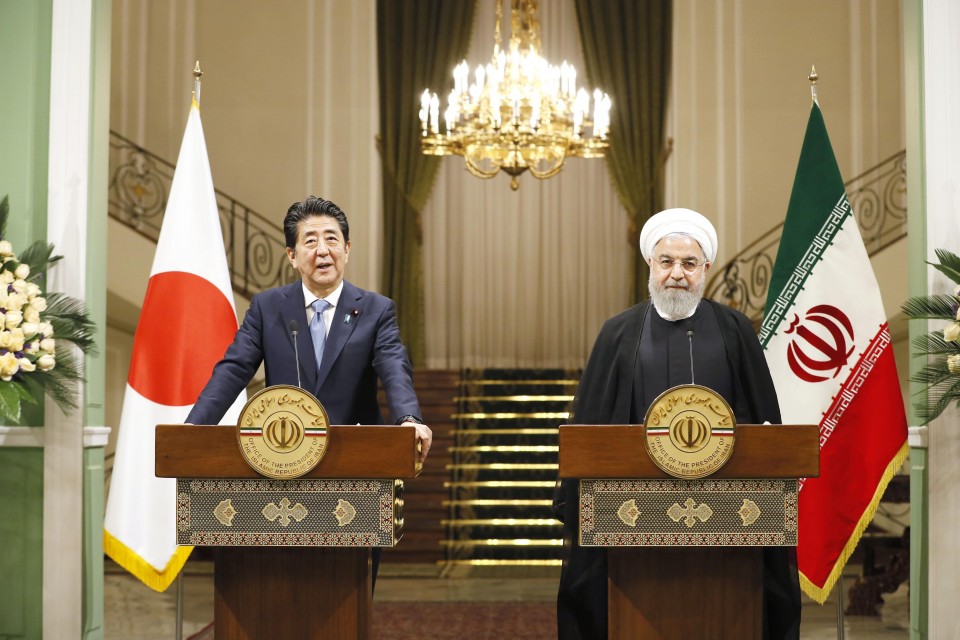TEHRAN, June 14 (NNN-KYODO) – Iran said Thursday it will not negotiate with the United States, rejecting Japanese Prime Minister Shinzo Abe’s bid to broker dialogue between the two foes amid escalating tensions in the Middle East.
Iran’s Supreme Leader Ayatollah Ali Khamenei stated that his country has “no intention to produce, possess or use nuclear weapons,” expressing his desire for peace in the region, Abe said after meeting him in Tehran.

Iran’s Supreme Leader Ayatollah Ali Khamenei. Photo courtesy of the Office of Iranian Supreme Leader
But Khamenei said in a statement that despite Japan’s efforts, “I do not consider (U.S. President Donald) Trump as a person worth exchanging any message with and I have no answer for him, nor will I respond to him in the future.”
“What Trump says, that he is not after regime change (in Iran), is a lie. For, if he could do so, he would. However, he is not capable of doing it,” Khamenei is also quoted as telling Abe, who acted as an interlocutor for the U.S. president.
Abe, on a two-day visit to Iran marking the first trip to the country by a Japanese prime minister in over four decades, admitted the road to easing tensions in the Middle East amid the standoff between Washington and Tehran will be rough but Japan will continue to work toward achieving peace and stability.
Before Abe met the press, two tankers, one operated by a Japanese company, were attacked near the Strait of Hormuz.

“I met face-to-face with Iran’s Supreme Leader Khamenei and I was able to hear of his belief in peace,” Abe told reporters. “It is a major step forward toward securing peace and stability in this region.”
While Japan and Iran have long enjoyed amicable ties, Abe is the first Japanese premier to have met with the Iranian supreme leader.
Khamenei has taken a hard-line approach toward the United States, in contrast to Iranian President Hassan Rouhani, with whom Abe held talks on Wednesday. Rouhani is considered more moderate and reached a landmark nuclear deal with the United States and other world powers in 2015.
Abe told Khamenei during their roughly 50-minute meeting that Japan supports the nuclear deal, voicing hope that Iran will abide by its commitments, according to a senior Japanese government official.
Among the leaders of countries with close ties to the United States, Abe is the first to have met with Khamenei since the Trump administration’s abrupt withdrawal from the nuclear deal in 2018.

Japanese Prime Minister Shinzo Abe (L) and Iranian President Hassan Rouhani. Photo courtesy of Kyodo
Abe visited Tehran in an attempt to serve as a mediator between Iran and the United States, Japan’s longtime security ally, with tensions having flared in recent weeks and concern growing about accidental military clashes in the Middle East, a vital area for energy-poor Japan.
Abe said he shared Trump’s thinking with Khamenei, adding it was important both leaders seek peace.
But referring to Abe’s remarks during the meeting that the United States is prepared to hold talks with Iran, Khamenei told the Japanese leader, “We do not believe that at all. Because genuine talks would not come from someone like Trump,” according to the statement.
Abe’s trip, the first by a Japanese leader to Iran since 1978, was seen as an attempt to boost Tokyo’s diplomatic profile abroad.
During his talks with Abe on Wednesday, Rouhani indicated Iran does not want a further escalation of the situation in the Middle East or war with the United States. But the president blamed the United States, and in particular what he described as the “economic war” Washington has launched against Tehran, for the heightened regional tensions.
Rouhani called for the lifting of oil sanctions by the United States and asked Abe to inform Trump of its demand, an Iranian government source said.
Iran said in May it was suspending some of its commitments under the nuclear deal. Tehran set a 60-day deadline to negotiate new terms, saying it would keep more enriched uranium than allowed under the agreement initially reached with the United States, Britain, France, Germany, Russia and China.
Washington has stepped up its military presence in the Middle East. It has dispatched an aircraft carrier strike group and bombers to the Persian Gulf and decided to send additional U.S. troops.
The last Japanese prime minister to visit Iran was Takeo Fukuda in September 1978. Tokyo’s ties with Tehran date back to 1929, with this year marking the 90th anniversary of the start of their diplomatic relationship.
Since Abe returned to office in 2012, he has met with Rouhani eight times. The Japanese leader told a joint press briefing on Wednesday that he hopes to meet the Iranian president again “soon” but did not elaborate.
NNN-KYODO






